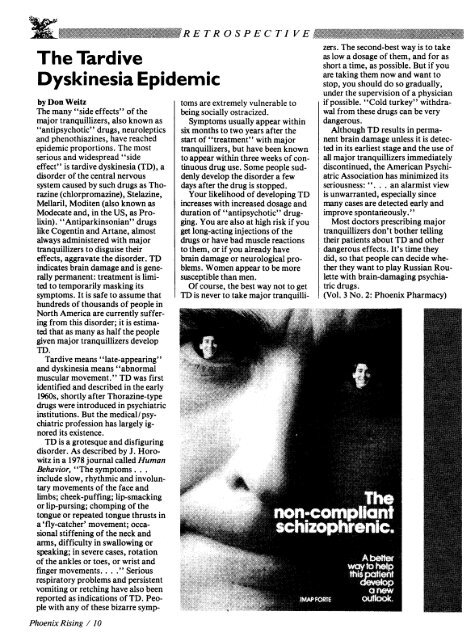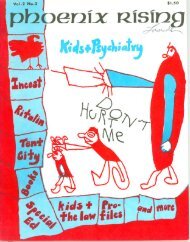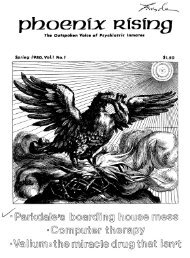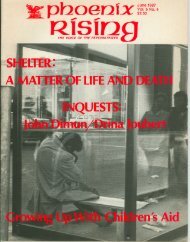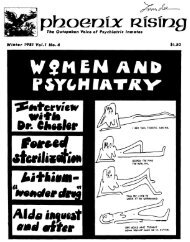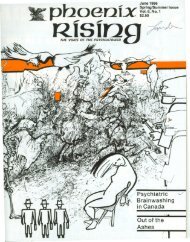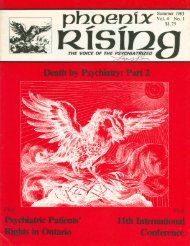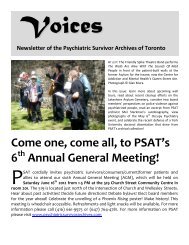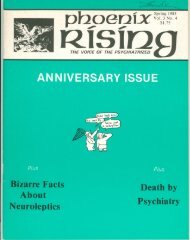Phoenix Rising - Psychiatric Survivor Archives of Toronto
Phoenix Rising - Psychiatric Survivor Archives of Toronto
Phoenix Rising - Psychiatric Survivor Archives of Toronto
Create successful ePaper yourself
Turn your PDF publications into a flip-book with our unique Google optimized e-Paper software.
~<br />
The Tardive<br />
Dyskinesia Epidemic<br />
by Don Weitz<br />
The many "side effects" <strong>of</strong>the<br />
major tranquillizers, also known as<br />
"antipsychotic" drugs, neuroleptics<br />
and phenothiazines, have reached<br />
epidemic proportions. The most<br />
serious and widespread "side<br />
effect" is tardive dyskinesia (TD), a<br />
disorder <strong>of</strong> the central nervous<br />
system caused by such drugs as Thorazine<br />
(chlorpromazine), Stelazine,<br />
Mellaril, Moditen (also known as<br />
Modecate and, in the US, as Prolixin).<br />
"Antiparkinsonian" drugs<br />
like Cogentin and Artane, almost<br />
always administered with major<br />
tranquillizers to disguise their<br />
effects, aggravate the disorder. TD<br />
indicates brain damage and is generally<br />
permanent: treatment is limited<br />
to temporarily masking its<br />
symptoms. It is safe to assume that<br />
hundreds <strong>of</strong> thousands <strong>of</strong> people in<br />
North America are currently suffering<br />
from this disorder; it is estimated<br />
that as many as half the people<br />
given major tranquillizers develop<br />
TD.<br />
Tardive means "late-appearing"<br />
and dyskinesia means "abnormal<br />
muscular movement." TD was first<br />
identified and described in the early<br />
1960s, shortly after Thorazine-type<br />
drugs were introduced in psychiatric<br />
institutions. But the medical/psychiatric<br />
pr<strong>of</strong>ession has largely ignored<br />
its existence.<br />
TD is a grotesque and disfiguring<br />
disorder. As described by J. Horowitz<br />
in a 1978journal called Human<br />
Behavior, "The symptoms ...<br />
include slow, rhythmic and involuntary<br />
movements <strong>of</strong> the face and<br />
limbs; cheek-puffing; lip-smacking<br />
or lip-pursing; chomping <strong>of</strong> the<br />
tongue or repeated tongue thrusts in<br />
a 'fly-catcher' movement; occasional<br />
stiffening <strong>of</strong> the neck and<br />
arms, difficulty in swallowing or<br />
speaking; in severe cases, rotation<br />
<strong>of</strong> the ankles or toes, or wrist and<br />
finger movements .... " Serious<br />
respiratory problems and persistent<br />
vomiting or retching have also been<br />
reported as indications <strong>of</strong>TD. People<br />
with any <strong>of</strong> these bizarre symp-<br />
<strong>Phoenix</strong> <strong>Rising</strong> / 10<br />
toms are extremely vulnerable to<br />
being socially ostracized.<br />
Symptoms usually appear within<br />
six months to two years after the<br />
start <strong>of</strong> "treatment" with major<br />
tranquillizers, but have been known<br />
to appear within three weeks <strong>of</strong> continuous<br />
drug use. Some people suddenly<br />
develop the disorder a few<br />
days after the drug is stopped.<br />
Your likelihood <strong>of</strong> developing TD<br />
increases with increased dosage and<br />
duration <strong>of</strong> "antipsychotic" drugging.<br />
You are also at high risk if you<br />
get long-acting injections <strong>of</strong> the<br />
drugs or have bad muscle reactions<br />
to them, or if you already have<br />
brain damage or neurological problems.<br />
Women appear to be more<br />
susceptible than men.<br />
Of course, the best way not to get<br />
TD is never to take major tranquillizers.<br />
The second-best way is to take<br />
as Iowa dosage <strong>of</strong> them, and for as<br />
short a time, as possible. But if you<br />
are taking them now and want to<br />
stop, you should do so gradually,<br />
under the supervision <strong>of</strong> a physician<br />
if possible. "Cold turkey" withdrawal<br />
from these drugs can be very<br />
dangerous.<br />
Although TD results in permanent<br />
brain damage unless it is detected<br />
in its earliest stage and the use <strong>of</strong><br />
all major tranquillizers immediately<br />
discontinued, the American <strong>Psychiatric</strong><br />
Association has minimized its<br />
seriousness: " ... an alarmist view<br />
is unwarranted, especially since<br />
many cases are detected early and<br />
improve spontarieously."<br />
Most doctors prescribing major<br />
tranquillizers don't bother telling<br />
their patients about TD and other<br />
dangerous effects. It's time they<br />
did, so that people can decide whether<br />
they want to play Russian Roulette<br />
with brain-damaging psychiatric<br />
drugs.<br />
(Vol. 3 No.2: <strong>Phoenix</strong> Pharmacy)


